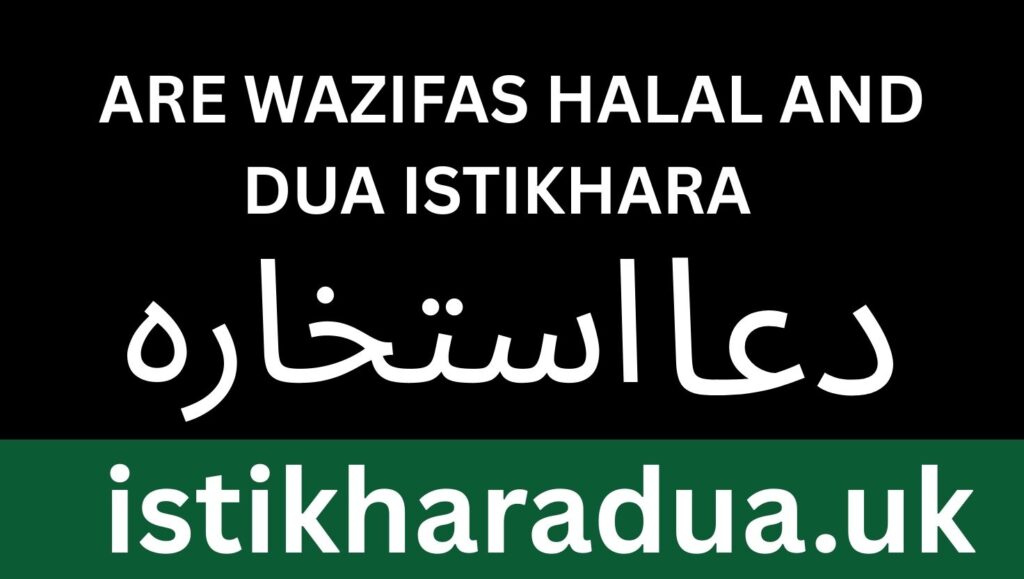
Are Wazifas Halal and Dua istikhara Are They Permissible?
If you’ve ever wondered, “Are wazifas halal?” you’re not alone. Many Muslims feel confused or anxious about whether repeating specific Quranic verses or supplications for intentions like protection or success aligns with Islam. A wazifa is a practice of reciting duas or Quranic verses consistently for a specific purpose. The key to whether wazifas are halal lies in their adherence to Islamic teachings.
According to Imam Ibn Taymiyyah, supplications are permissible if they’re rooted in the Quran and authentic Hadith, avoiding bid’ah (innovations). The Quran encourages dua: “And your Lord says, ‘Call upon Me; I will respond to you’” (Quran 40:60). For example, reciting Surah Al-Fatiha for blessings is a halal prayer, as it’s based on the Quran. However, wazifas involving unverified rituals, like reciting a verse 1000 times for wealth without Hadith evidence, can lead to problematic practices or even shirk (associating partners with Allah).
To ensure wazifas are halal, use authentic Islamic supplications from sources like Hisnul Muslim or Sunnah.com. This approach keeps your practice aligned with wazifa permissibility and strengthens your connection with Allah.
Busting Myths About Wazifas
Misconceptions about wazifas can cause confusion. Let’s address common myths:
Myth: Wazifas guarantee instant results.
Reality: Allah answers duas in His wisdom and timing. A Hadith in Sahih Muslim states, “A servant’s dua is answered as long as it avoids sin or breaking family ties” (Muslim, 2735).Myth: Specific counts make wazifas more effective.
Reality: Only counts prescribed in Hadith, like saying “SubhanAllah” 33 times after salah (Bukhari, 843), are authentic.Myth: Wazifas replace obligatory worship.
Reality: Halal prayers like wazifas complement, not substitute, salah or other duties.
Case Study: Finding Peace with Authentic Wazifas
Amina, a 29-year-old teacher, faced anxiety about her upcoming marriage decision. A friend suggested a wazifa involving reciting a verse 500 times daily at a specific time. Unsure if this was halal, Amina consulted a scholar who recommended sticking to authentic Islamic supplications. She began reciting “Hasbiyallahu la ilaha illa Huwa” (Quran 9:129) after Fajr with sincerity, without rigid counts. Over weeks, Amina felt calmer, and her engagement progressed smoothly. This experience shows how halal wazifas, grounded in Quran and Sunnah, bring peace and clarity.
Dua Istikhara: Seeking Allah’s Guidance
Dua Istikhara is a powerful Sunnah prayer for seeking Allah’s guidance in decisions like marriage, jobs, or relocation. The Prophet (PBUH) taught: “If anyone of you is deliberating about a decision, he should offer two rak’ahs and then say the Istikhara dua” (Bukhari, 1166). This halal prayer helps Muslims align with Allah’s plan, reducing anxiety about life’s uncertainties.
How to Perform Dua Istikhara
Performing Dua Istikhara is simple and accessible for beginners:
Pray Two Rak’ahs: Offer two non-obligatory rak’ahs, reciting any surahs after Al-Fatiha.
Recite the Istikhara Dua: Say the dua from Sahih Bukhari, starting: “Allahumma inni astakhiruka bi’ilmika…” (O Allah, I seek Your guidance by Your knowledge).
State Your Intention: Mentally or verbally specify the decision you need guidance on.
Trust Allah’s Plan: Look for clarity in your heart, circumstances, or dreams, but avoid expecting dramatic signs.
Real-Life Examples of Dua Istikhara
Marriage Decision: Sarah, 26, prayed Dua Istikhara about a proposal. She felt unease afterward and noticed communication issues, leading her to decline. Later, she found a more compatible partner.
Career Choice: Ahmed performed Dua Istikhara when choosing between two job offers. A colleague’s advice clarified his path, and he chose a role aligned with his values.
Relocation: Noor prayed Dua Istikhara before moving abroad. She felt peace and received unexpected support, confirming her decision.
Beginner Tips for Wazifas and Dua Istikhara
If you’re new to wazifas or Dua Istikhara, these tips can help:
Use Authentic Sources: Choose Islamic supplications from the Quran or Hadith, like those in Hisnul Muslim.
Avoid Innovations: Stick to Sunnah to ensure wazifa permissibility and avoid bid’ah.
Be Patient: Trust Allah’s timing, as “Perhaps you dislike something which is good for you” (Quran 2:216).
Memorize the Dua: Practice the Istikhara dua for ease during prayer.
Seek Knowledge: Consult scholars or use resources like Sunnah.com for guidance.
Islamic Rulings on Wazifa Permissibility
Scholars like Sheikh Al-Uthaymeen emphasize that wazifas are halal if they follow Quran and Sunnah. For example, reciting Surah Al-Ikhlas three times for protection is based on Hadith (Tirmidhi, 2829). However, unverified practices, like chanting verses for specific worldly gains without evidence, are discouraged. The Quran warns: “Do not pursue that of which you have no knowledge” (Quran 17:36). Ensuring wazifas are halal prayers strengthens their spiritual value.
FAQs About Wazifas and Dua Istikhara
Are wazifas halal in Islam?
Wazifas are halal if they follow Quran and Sunnah, using authentic Islamic supplications without innovations or shirk. Stick to verified sources like Hisnul Muslim.
What is Dua Istikhara for?
Dua Istikhara is a Sunnah prayer to seek Allah’s guidance for decisions like marriage or jobs, ensuring halal prayers align with His will.
Do wazifas guarantee results?
No, Allah answers halal prayers based on His wisdom, not guaranteed outcomes. Trust His timing, as mentioned in Hadith (Muslim, 2735).
How many times to recite a wazifa?
Use counts from Hadith for halal prayers, like 33 times for dhikr after salah (Bukhari, 843), ensuring wazifa permissibility.
What if Istikhara shows no signs?
Trust your heart’s inclination or circumstances after Dua Istikhara; Allah guides subtly through halal prayers (Bukhari, 1166).
Can wazifas replace salah?
No, wazifas are Islamic supplications that complement, not replace, obligatory worship like salah. They must always be halal prayers.
Where to find authentic wazifas?
Find halal prayers in Hisnul Muslim or Hadith collections like Sunnah.com to ensure wazifa permissibility and authenticity.
Author Bio
Maira Kamran is a passionate content writer dedicated to creating informative and engaging content that resonates with readers. With a focus on Islamic practices and lifestyle, Maira aims to provide valuable insights to help readers navigate their spiritual and everyday lives. Visit her whatsapp, for more helpful resources and guides.
